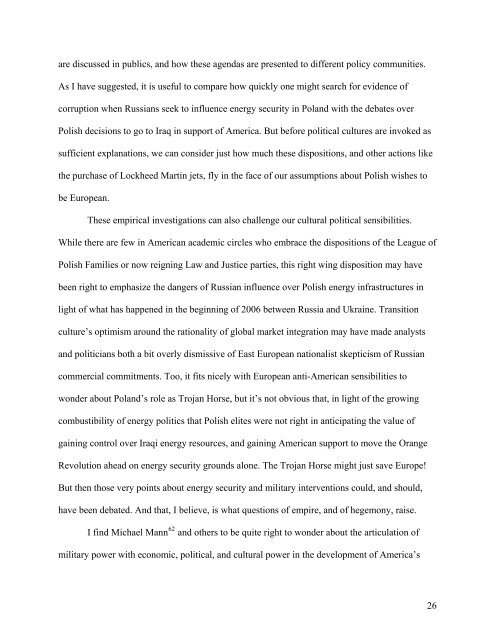from transition to hegemony - The Watson Institute for International ...
from transition to hegemony - The Watson Institute for International ...
from transition to hegemony - The Watson Institute for International ...
You also want an ePaper? Increase the reach of your titles
YUMPU automatically turns print PDFs into web optimized ePapers that Google loves.
are discussed in publics, and how these agendas are presented <strong>to</strong> different policy communities.<br />
As I have suggested, it is useful <strong>to</strong> compare how quickly one might search <strong>for</strong> evidence of<br />
corruption when Russians seek <strong>to</strong> influence energy security in Poland with the debates over<br />
Polish decisions <strong>to</strong> go <strong>to</strong> Iraq in support of America. But be<strong>for</strong>e political cultures are invoked as<br />
sufficient explanations, we can consider just how much these dispositions, and other actions like<br />
the purchase of Lockheed Martin jets, fly in the face of our assumptions about Polish wishes <strong>to</strong><br />
be European.<br />
<strong>The</strong>se empirical investigations can also challenge our cultural political sensibilities.<br />
While there are few in American academic circles who embrace the dispositions of the League of<br />
Polish Families or now reigning Law and Justice parties, this right wing disposition may have<br />
been right <strong>to</strong> emphasize the dangers of Russian influence over Polish energy infrastructures in<br />
light of what has happened in the beginning of 2006 between Russia and Ukraine. Transition<br />
culture’s optimism around the rationality of global market integration may have made analysts<br />
and politicians both a bit overly dismissive of East European nationalist skepticism of Russian<br />
commercial commitments. Too, it fits nicely with European anti-American sensibilities <strong>to</strong><br />
wonder about Poland’s role as Trojan Horse, but it’s not obvious that, in light of the growing<br />
combustibility of energy politics that Polish elites were not right in anticipating the value of<br />
gaining control over Iraqi energy resources, and gaining American support <strong>to</strong> move the Orange<br />
Revolution ahead on energy security grounds alone. <strong>The</strong> Trojan Horse might just save Europe!<br />
But then those very points about energy security and military interventions could, and should,<br />
have been debated. And that, I believe, is what questions of empire, and of <strong>hegemony</strong>, raise.<br />
I find Michael Mann 62 and others <strong>to</strong> be quite right <strong>to</strong> wonder about the articulation of<br />
military power with economic, political, and cultural power in the development of America’s<br />
26
















